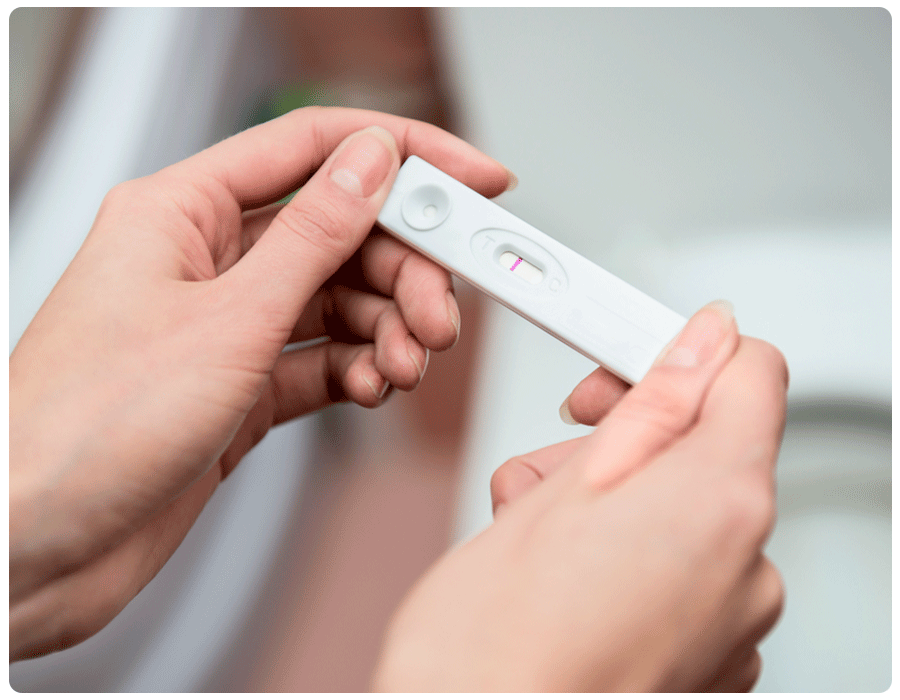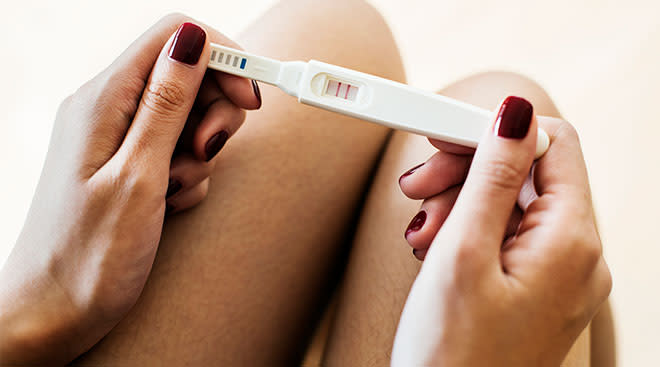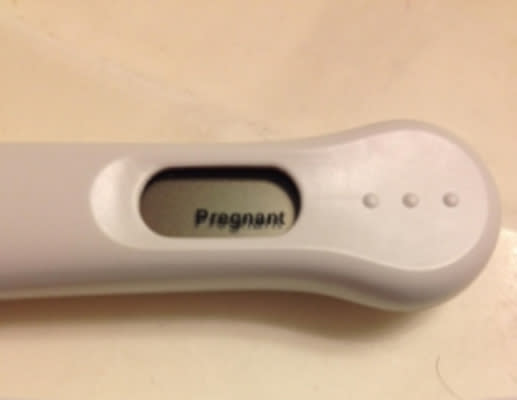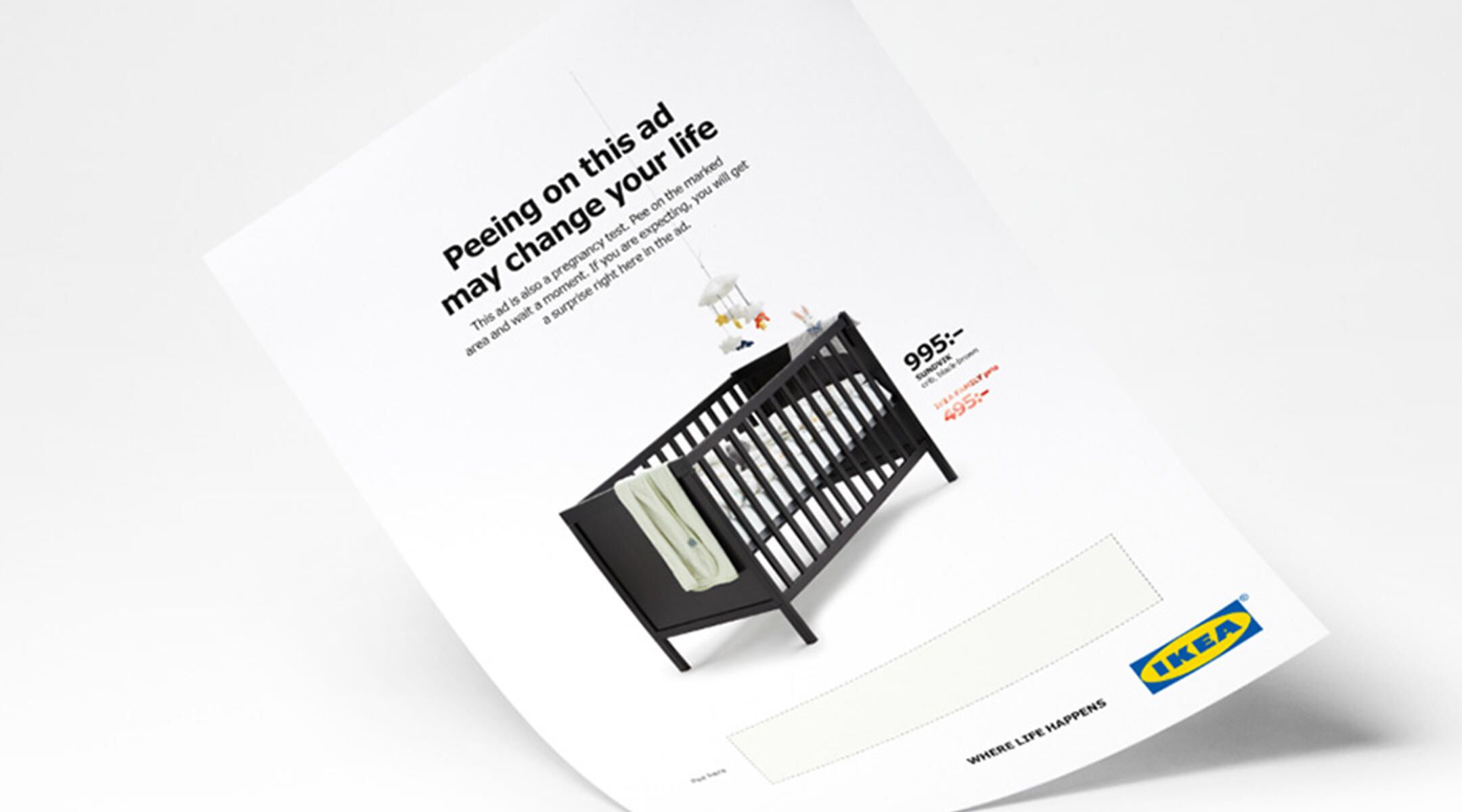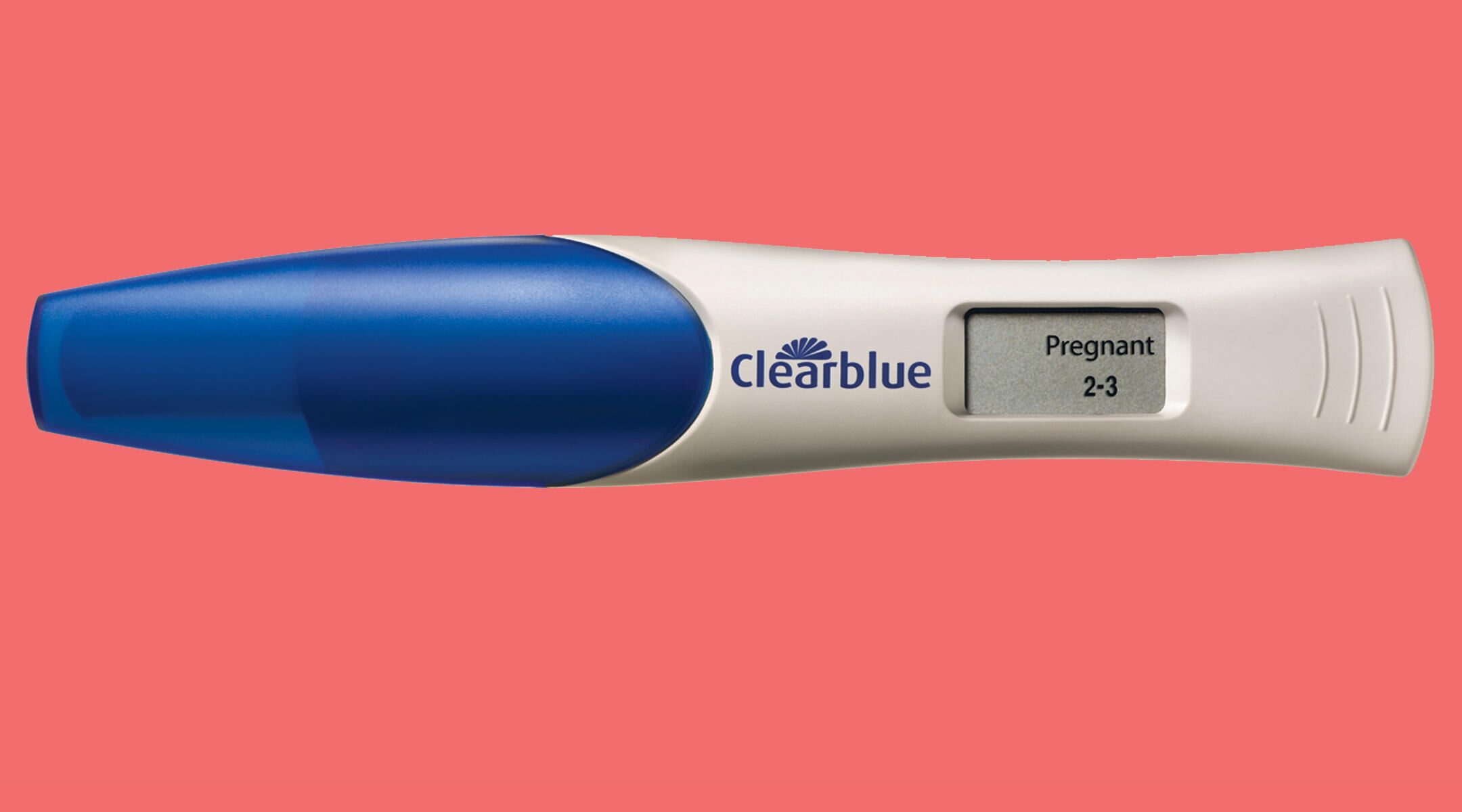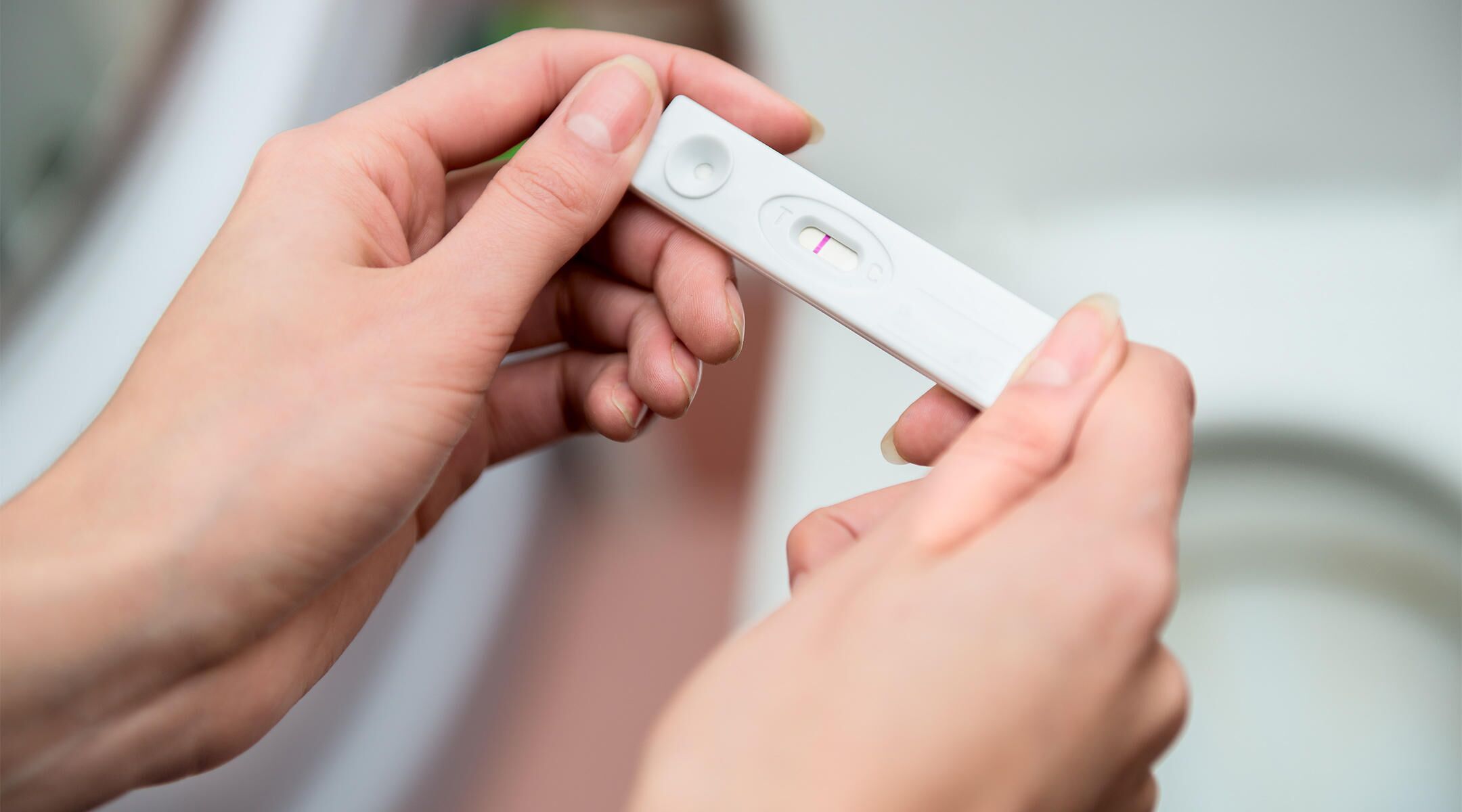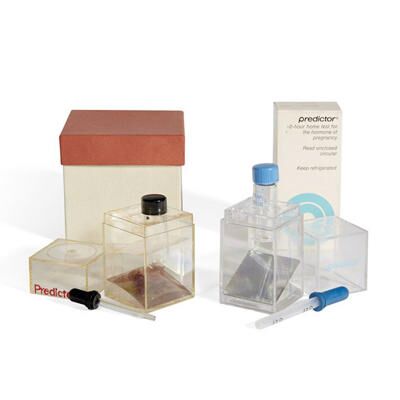What It Means if You Get a Negative Pregnancy Test (Plus, Next Steps!)
Trying to conceive can be nerve-wracking as it is. But if you have all the early pregnancy symptoms, and a pregnancy test still comes back negative, you might be extra confused.
“I was supposed to get my period the other day, but didn’t get it,” shares The Bump community member JLSBWG. “I took a pregnancy test today and it was negative. I’m usually on a 28-day cycle and have never gone over 30 days. I’m currently on day 31. I have the light cramping that I had when I was first pregnant with my son. I’m not sure what to think… I guess I’ll just wait and see and retest in another day or so if I don’t get it.”
Here, experts break down why you might get a negative pregnancy test when you think you’re pregnant—and what to do next.
- Some common reasons your pregnancy test could be negative are if you’re testing too early or if you didn’t follow the test instructions. Or, you might not be pregnant (your period is late for another reason).
- A negative pregnancy test looks like one single line on your pregnancy test stick.
- If your at-home pregnancy test is negative but you think you’re pregnant, wait a few days and test again. Then, reach out to your medical provider if you have questions.
There are a variety of reasons you might get a negative pregnancy test when you think you’re actually pregnant—experts say that testing too early is a common one.
You’re not pregnant
It’s possible to have some subtle symptoms of pregnancy that are actually indicative of another medical condition. If you’ve been actively trying, it’s also plausible that you could be critically scanning and overanalyzing every tiny little bodily function in hopes that it points to pregnancy.
You’re testing too early
Pregnancy tests detect hormone human chorionic gonadotropin (hCG), which only ramps up when a growing embryo starts to burrow into the uterine lining (roughly two weeks after ovulation and conception, or around the time of a missed period). “If you test too early and baby’s not attached yet, you’re not going to have that positive hCG level,” says Catherine Caponero, DO, an ob-gyn with Cleveland Clinic in Beachwood, Ohio.
Some tests promise to pick up hCG levels up to a week before your missed period, with the caveat that there’s still a decent chance you’ll get a false negative. For example, the First Response Early Result pregnancy test promises to accurately detect pregnancy in 76 percent of pregnant people five days before their period. That rate increases to more than 99 percent in people who test up to three days before their presumed period.
Charlene Emmanuel, MD, an ob-gyn at NewYork-Presbyterian/Columbia University Irving Medical Center in NYC, says that everyone ovulates at a different time in their cycle. If you ovulate on the late side, you may not get a positive pregnancy test until “a couple of days past” a missed period, she notes.
I took three pregnancy tests and got all negatives. One on the day I was supposed to get my period, and then the next two in the week after. I waited and waited. Finally, I just went to the doctor and got a positive! That was about a week-and-a-half after my period was supposed to be there. Turns out my cycle was just really, really off that month.
You’re ovulating
Not everyone experiences symptoms when they ovulate. That said, some women are very in tune with their bodies. According to the American Pregnancy Association, common signs of ovulation can be similar to early pregnancy symptoms (think: spotting, cramping, breast soreness, bloating, etc.) So if you’re unsure of your cycle timing, you could mistake one for the other. In this scenario, you’d get a negative test simply because you’re ovulating. In other words, you might not be pregnant—even if you’re feeling all the “telltale” things.
Your period is late
Do you have a negative pregnancy test, but no period? Your period could be late. Premenstrual syndrome (PMS) can also cause some of the same symptoms as early pregnancy, including tender breasts, mood swings and bloating, notes Jordan Schaumberg, MD, an assistant professor of obstetrics and gynecology at Duke University School of Medicine.
Certain infections and some medication changes can cause a single missed period. “Generally, one missed period with otherwise regular cycles and a negative pregnancy test is not cause for alarm,” Schaumberg adds. If your period is consistently unpredictable, there may be an underlying cause, such as polycystic ovary syndrome (PCOS). Adds Caponero: “Along with PCOS, patients who experience elevated stress levels’ extremities in weight; thyroid disorders; chronic health conditions such as diabetes, primary ovarian insufficiency, perimenopause or uterine scarring can also have delayed or missed periods. Birth control can also cause irregularities in your cycle.”
You didn’t use your first morning urine to test
When you don’t drink or pee for many hours overnight, your urine becomes concentrated, says Emmanuel, making your hCG levels more detectable right when you wake up. The time you test matters less the further along you think you might be. If at least a week has passed since your expected period, you can most likely test any time of the day and still expect an accurate result, she adds.
You drank a lot of water
Chugging a ton of fluids soon before taking your pregnancy test can dilute your urine, potentially leading to a false negative, says Emmanuel.
You didn’t follow all the testing instructions
You’re human—and user error happens! Be sure to read and follow all boxed instructions before testing, which usually includes waiting two minutes to read your result. And make sure to test “mid-stream” as you’re peeing—otherwise, the test “can be contaminated with bacteria and cause a false negative,” says Emmanuel.
The test is expired
“Home pregnancy tests are just as reliable as the [urine] tests that your doctor’s office is using,” says Caponero. That said, there’s a reason they have expiration dates: They do become less reliable with time. “Always check the expiration date before use,” Emmanuel advises.
You’re unexpectedly expecting twins
Very high levels of hCG in twin pregnancies can potentially cause false negatives in both blood and urine pregnancy tests at around the end of the first trimester, says Emmanuel. Known as the “hook effect,” the ratio of hCG “overwhelms the pregnancy test,” explains Caponero.
You have a (rare) unviable pregnancy
The hook effect—a false negative due to very high hCG levels—can also occur with gestational trophoblastic disease (GTD), says Caponero, a rare group of conditions including molar pregnancy that occur in roughly 1 in 1,000 pregnancies. In GTD, abnormal trophoblasts—the cells that surround a recently fertilized egg and help it implant in the uterine lining—form a tumor. GTD pregnancies aren’t viable. Treatments vary and include surgery, chemotherapy and radiation therapy.
In an ectopic pregnancy, a fertilized egg implants outside of the uterus. Because hCG levels are lower in ectopic pregnancies, you may get a negative test result for the first couple of days after a missed period, explains Emmanuel. Ectopic pregnancy occurs in about 2 percent of all pregnancies. It’s not viable and can cause life-threatening bleeding, so your provider will give you medication to stop cell growth.
Keep in mind that both of these conditions are rare and that they’re usually accompanied by symptoms such as pelvic pain and bleeding not related to your period. “There are other reasons to not see a positive pregnancy test right away, so don’t panic if you don’t see a positive pregnancy test immediately with a missed period,” says Schaumberg.
If you’re wondering exactly what a negative pregnancy test looks like, here’s an example. Note that it differs from pregnancy test to pregnancy test, but the hallmark one distinct line—or, in the case of a digital test, the words “not pregnant”—will be there.
This might feel like a big hurdle in your grand plan, but it’s not the end of the line. You can continue to be proactive in your journey. Here’s what to do.
Wait a few days and test again
If you used an expired pregnancy test or didn’t follow testing instructions, it doesn’t hurt to test again right away. Otherwise, it’s best to wait a week before using a home pregnancy test again. A pregnancy test “may or may not be positive right at the first day of your missed period, even if you’re pregnant,” says Schaumberg.
Reach out to your provider
A one-off missed period is usually nothing to worry about. But if you’re concerned about your symptoms, especially if you have unusual pain or bleeding, Schaumberg suggests reaching out to your healthcare provider. Consistently irregular periods may signal a medical condition like PCOS, says Caponero. And pregnancy-like symptoms, including irregular periods, cramping, back pain, pelvic pain and abdominal bloating, may be due to other health conditions, including uterine fibroids or ovarian cysts, notes Emmanuel.
Remember, it takes time
Caponero reminds patients that it can take up to an entire year to get pregnant, even if you’re healthy and under 35. “Giving your body time to conceive is really important,” she says. If you’re over 35, talk to your doctor if you’ve been trying for at least six months; if you’re over 40, schedule an appointment right away.
Try out an ovulation kit
Still feeling stressed? Schaumberg suggests trying an over-the-counter ovulation predictor kit, which can help you nail down the day you’re ovulating and maximize your odds of conception.
Be kind to yourself
Trying to conceive can feel stressful—and stress doesn’t help with conception. Find ways to bring more joy and self-care to your everyday life: Exercise, eat nutritious foods, make sure to get enough sleep and spend time with your family and friends. Caponero also recommends meditation (consider trying a meditation app if you’re new to it). “There are some pretty good studies that show that meditation can actually improve fertility rates,” she says.
Talk about it
“For a patient who’s actively trying to conceive, the stress and pressure that come with pregnancy testing can be very intense,” Schaumberg says. Keep the lines of communication open with your partner and healthcare provider. If fertility concerns are impacting your overall wellbeing, talking with a therapist, especially one who specializes in fertility issues, can help.
Frequently Asked Questions
Can you be pregnant and test negative on a pregnancy test?
True false negative pregnancy tests are rare. Again, it could be that you’re testing too early. Experts say that pregnancy tests look for the hormone human chorionic gonadotropin (hCG), which goes up around the time of your missed period. If you test too early, you might not have that positive hCG level yet. Additionally, check to make sure that you’re not using an expired pregnancy test.
Why is my period late, but pregnancy test negative?
Your period could be late for reasons other than pregnancy, including certain conditions, infections and medication changes. In general, one late period isn’t cause for concern, but if it becomes a pattern, it’s a good idea to check in with your provider.
Can a negative pregnancy test turn positive?
A positive pregnancy test will appear within the timeframe specified on the instructions, usually around 10 minutes. If a faint line appears on your negative pregnancy test after this time frame, it’s most likely an evaporation line, per Cleveland Clinic. This is typically a colorless, blurry line that’s a result of urine drying out, and it doesn’t signify a positive pregnancy test.
Can ectopic pregnancy test negative on a pregnancy test?
Again, hCG levels are lower in ectopic pregnancies, so you could test negative for the first couple of days after your missed period. If you’re experiencing ectopic pregnancy symptoms such as pelvic pain and bleeding, make sure to see your healthcare provider right away.
How long after a miscarriage will pregnancy test be negative?
It can take two to four weeks for your pregnancy test to be negative after a miscarriage, says Christine Greves, MD, an ob-gyn at the Orlando Health Women’s Institute.
The National Health Service UK advises to take a home pregnancy test about three weeks after a miscarriage—once hCG levels have sufficiently gone down. If the test shows you’re still pregnant at this point, make sure to contact a healthcare provider.
Can you reuse a pregnancy test that was negative?
No, you shouldn’t reuse a pregnancy test, even if it was negative, says Greves, because a chemical reaction has already occurred. In fact, most pregnancy test kit instructions will tell you to only “use once.” Make sure to follow all the testing instructions for the most accurate results.
There are many reasons you might get a negative pregnancy test. If you’re trying to conceive, be patient and kind to yourself. It might be too early to detect your pregnancy, so be sure to wait a few days and try again. If you have any concerns—like repeatedly getting a negative pregnancy test, but no period—make sure to check in with your healthcare provider.
Please note: The Bump and the materials and information it contains are not intended to, and do not constitute, medical or other health advice or diagnosis and should not be used as such. You should always consult with a qualified physician or health professional about your specific circumstances.
Plus, more from The Bump:
Catherine Caponero, DO, is an ob-gyn with Cleveland Clinic in Beachwood, Ohio. She earned her medical degree from Lake Erie College of Osteopathic Medicine.
Charlene Emmanuel, MD, is an ob-gyn at NewYork-Presbyterian/Columbia University Irving Medical Center in NYC. She earned her medical degree from University of Rochester School of Medicine and Dentistry.
Christine Greves, MD, FACOG, is an ob-gyn at the Orlando Health Women’s Institute. She received her medical degree from the University of South Florida College of Medicine.
Jordan Schaumberg, MD, is an assistant professor of obstetrics and gynecology at Duke University School of Medicine. She earned her medical degree from George Washington University School of Medicine and Health Sciences.
American Pregnancy Association, Am I Pregnant, Or Is It Something Else?
Cleveland Clinic, Ectopic Pregnancy, January 2023
Cleveland Clinic, Pregnancy Tests, November 2022
Cureus, A Case of a Negative Urine Pregnancy Test in a Multiple Gestation Pregnancy, October 2022
First Response, First Response Early Result Pregnancy Test
Mayo Clinic, Miscarriage, September 2023
National Health Service UK, Miscarriage, March 2022
Real-parent perspectives:
- JLSBWG, The Bump community member
- savannat421, The Bump community member
Learn how we ensure the accuracy of our content through our editorial and medical review process.
Navigate forward to interact with the calendar and select a date. Press the question mark key to get the keyboard shortcuts for changing dates.

































